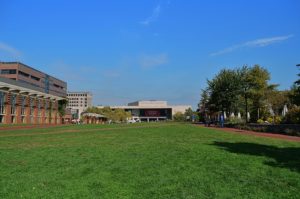A Lack of Stories:
As I walked to the train tracks after my first interviews in Philadelphia, I thought long-and-hard about what I learned. For all of the talks about polarization and political decay, people were relatively optimistic about themselves, others, and our country. Most people mentioned caring about their community. But there was one question that the first eleven people all felt uncomfortable or unsure answering. Very few people could confidently tell me a story in which someone exemplified good citizenship.
people all felt uncomfortable or unsure answering. Very few people could confidently tell me a story in which someone exemplified good citizenship.
Alarmed, I thought about why this was. Did people just not think about it? Or, maybe, we don’t celebrate great citizens enough? Or was it something else entirely?
Some Reassurance
Fortunately, I saw something on my way home that heartened me. As I waited for my train, I stood on the platform looking around. Out of the corner of my eye, I saw a blind woman with a guide dog, standing by a SEPTA employee. For ten minutes, they carried on their conversation, both smiling and laughing. When the train arrived, he walked her on. But he didn’t just walk her on. He smiled the whole time, made sure that she had a great seat, talked to the conductor to make sure he knew of her limitations, and gave her an incredibly warm goodbye.
Clearly, this man’s job was to help this woman. But he didn’t need to talk to her, or be so engaged, or make sure she had everything she needed. If, as Taylor said in her interview, respecting others and the community is the key to being a good American, then this man was a great American. If taking action – seeing a potential problem and doing something about it – is what makes us good citizens, as Doug and Carol said it was, then this man was also a great citizen.
How We Can All Improve
I know from my own experience, it can be intimidating to try to “be a better citizen.” The idea can seem abstract and impossible to live up to. But as this man on the train platform showed, we can all contribute.
So, for those looking to be better citizens, I recommend starting small. When interacting with a member of your community, be as helpful as possible and as kind as possible. Make sure that any person you’re helping, whether through your job, through community service, or through coincidence, knows you want to do it. It’ll make them feel better, and probably you too. It’ll develop your confidence to make a difference and provide you a foundation to do more. And, perhaps most importantly, being engaged, kind, and intentional is a step in building a stronger community in which everyone knows a good citizen when they see one.